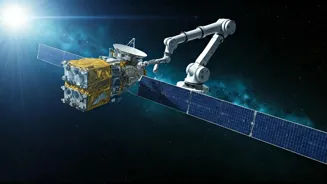OrbitAID Unveiling
ISRO has recently inaugurated the OrbitAID research facility in Bengaluru. The primary focus of this facility is to improve on-orbit servicing of satellites.
This venture reflects India's commitment to creating a more robust and sustainable space environment. OrbitAID aims to provide solutions for extending the lifespan of satellites, as well as offering repair capabilities, thereby reducing space debris and promoting long-term space missions. With this initiative, ISRO is stepping towards becoming a key player in developing advanced technologies for servicing and maintaining satellites in orbit, reinforcing its dedication to space exploration and sustainable practices. The Bengaluru lab is expected to become a hub for research, development, and innovation in this specialized field, thereby enhancing India's prominence in the global space arena.
Servicing in Space
On-orbit servicing includes a variety of procedures carried out in space to maintain and improve the utility of satellites. These services include refueling satellites, carrying out repairs, deploying new payloads, and eliminating space debris. The development of these technologies reduces the amount of space debris by extending the lifespan of the satellites. This also lowers the total cost of space missions as it reduces the necessity to launch new satellites. OrbitAID is designed to focus on specific aspects like robotics, spacecraft operations, and advanced sensors necessary for these in-space operations. The success of such initiatives can change how we handle space operations, creating a more sustainable, economical, and secure space environment. By promoting cooperation and the development of these technologies, ISRO is contributing to a more sustainable future for space activities.
Sustainable Space Ecosystem
The concept of a sustainable space ecosystem is becoming increasingly important as space becomes more congested. This means finding solutions to reduce space debris, extend the lives of satellites, and ensure that space missions do not harm the Earth. OrbitAID contributes to this goal by providing technologies that can help service and repair satellites already in orbit. This reduces the requirement for new launches, minimizing the risk of producing space junk. Furthermore, it helps in extending the operational life of current satellites, thereby increasing their effectiveness. By investing in such innovative technologies, ISRO strengthens its commitment to environmental responsibility in space exploration. This move demonstrates a long-term vision for space exploration that focuses on reducing environmental impact and ensuring that space continues to be a resource for scientific and commercial exploration.
Future of ISRO
The establishment of OrbitAID marks a new chapter in ISRO's development. The agency is now positioned to become a leader in on-orbit servicing technology. ISRO's ambition goes beyond the traditional aspects of space exploration, including the creation of a sustainable space ecosystem. By creating facilities such as OrbitAID, ISRO is fostering collaborations, attracting talent, and developing cutting-edge technology. These efforts will enable India to play a major role in future space missions. As ISRO continues to lead the field, it has the ability to influence global discussions regarding the sustainable management of space resources, which is essential for long-term space activities. The organization's progress not only advances space exploration but also stimulates innovation and encourages other countries to follow suit, establishing a foundation for a cooperative and sustainable space future.















